Hay-on-Wye Cinema Bookshop
“If books merely convey plots and characters why in the age of cinema read a book? What can books give us that movies can’t?
In two words: beautiful writing?“
—Peter Selgin, 179 Ways to Save a Novel: Matters of Vital Concern to Fiction Writers
I diligently pondered this question while working my way through a MFA Program in Creative Writing.
If I was going to donate an additional two years to earning a graduate degree that was supposed to help refine my skill at writing fiction, an art form I loved, I also needed to know what I could offer in the way of entertainment that other forms did and could not.
I also wanted to know the lure of movies to which writers should not aspire when crafting fiction against the backdrop of what movies do so well.
Identifying this I could then focus on honing the qualities and my skills at creating them in the literary art form of crafting fiction and forget about trying to endow my stories with what only cinematic creations can yield.
A licensed psychotherapist, it was my second time in graduate school. My thoughts naturally veered back to the psychological aspects of entertainment regarding reading versus watching a movie.
After much pondering—and with no satisfactory answer I queried what drew me to reading.
Yes, like many fellow writers and graduate students, I had entered my MFA program with the foremost goal of improving my skill at crafting fiction. Yet completion of such a program requires an equal amount of reading.
Matriculation through the Goddard MFA Program in Creative Writing, where I earned my degree required students to read and write shore analysis papers (2-3 pages) on 45-60 books.
The best, and I would submit the happiest and most successful writers are those who love reading as much if not more than writing. The two activities work hand in hand, each supporting the other with reading having the upper hand.
Reading does not necessarily require that one write. But the reverse is a must for writers.
So what was really my draw to my efforts and seeking to earn an MFA? And beyond that why I had really sought to become a writer of fiction?
Ann Patchett states that oftentimes we become writers to create the story(ies) we yearn to read. That was certainly my case. And yet how do we know that the story we wish to read does not exist without having read other works and found it missing.
Writers, whether we can acknowledge it, come to writing out of a love of reading.
And yet those to whom we strive to offer our creations come to reading as a form of escape, better known as entertainment.
The question we writers much answer is how to refine our abilities as crafting fiction.
Part of doing that means delineating what books do best—i.e. identifying the unique gift of reading and what it offers to the human experience in the way of stepping out side of the humdrum day to day living that we all tire of.
In my experience books give me not simply a story a intermingling of characters and plot, but rather a story that leads me to the internal experience of the characters around whom the story swirls.
The best movies give a wonderful visual experience. But even they cannot take me into the hearts and minds, the souls of the characters, the eye of their thoughts, the waters of their emotions.
This is what books do. This I am left with not just a story but also a here-and-now experience that in re-reading or memorizing the words that conjure the tale, I can relive the moment(s) as long as my mind can hold onto them.
Here memory faces off with cinematic expression.
In that hearing is the last sense to remain when all others hav

